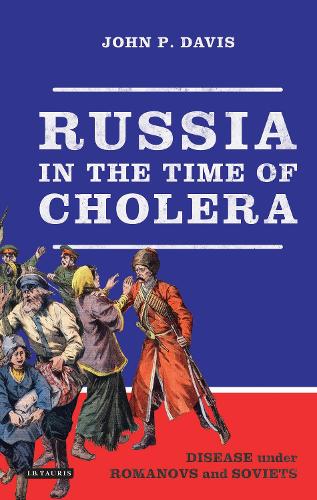
Russia in the Time of Cholera: Disease under Romanovs and Soviets
(Hardback)
Publishing Details
Russia in the Time of Cholera: Disease under Romanovs and Soviets
By (Author) John P. Davis
Bloomsbury Publishing PLC
I.B. Tauris
9th March 2018
United Kingdom
Classifications
Tertiary Education
Non Fiction
History and Archaeology
Human geography
Epidemiology and Medical statistics
610.947
Physical Properties
Hardback
336
Width 138mm, Height 216mm
531g
Description
As the nineteenth century drew to a close and epidemics in western Europe were waning, the deadly cholera vibrio continued to wreak havoc in Russia, outlasting the Romanovs. Scholars have since argued that cholera eventually fell prey to better sanitation and strict quarantine under the Soviets, citing as evidence imperial mismanagement, a `backward' tsarist medical system and physicians' anachronistic environmental interpretations of the disease. Drawing on extensive archival research and the so-called `material turn' in historiography, however, John P. Davis here demonstrates that Romanov-era physicians' environmental approach to disease was not ill-grounded, nor a consequence of neo-liberal or populist political leanings, but born of pragmatic scientific considerations. The physicians confronted cholera in a broad and sophisticated way, essentially laying the foundations for the system of public health that the Soviets successfully used to defeat cholera during the New Economic Policy (1922-1928). By focusing for the first time on the conclusion of the cholera epoch in Russia, Davis adds an indispensable layer of nuance to the existing conception of Romanov Russia and its complicated legacy in the Soviet period.
Reviews
'John Davis's research on cholera in Russia is a groundbreaking synthesis of political and social history with environmental history and the history of science. By considering Russian responses to the disease in the context of nineteenth century scientific debates, Davis challenges the received wisdom both about the nature of the scientific "bacteriological revolution" and about the "backwardness" of Russian science. Davis casts Russia's environment as a powerful actor in the story of the diffusion of cholera and explores the particular difficulty of containing cholera in Russia because of its geographical and geo-epidemiological characteristics. Davis also explores the profound continuities in the battle with cholera across the revolutionary divide, showing how Soviet medicine built on Tsarist policies to conquer the disease.' - Karen Petrone, Professor of History, University of Kentucky, 'John Daviss pioneering volume makes a distinct contribution to scholarship. It treats intelligently an important and long-lasting episode in imperial Russian and Soviet history. It adds to medical and environmental history as essential components of cultural history by arguing that the study of the cholera in Russia paralleled the modernization of the country. The book demonstrates that the history of epidemiology can tell us much about the intersection of sociopolitical unrest and economic dislocation.' - Lucien Frary, Professor of History, Rider University, 'Russia in the Time of Cholera makes important contributions to both Russian history and the history of medicine. Arguing that Russian physicians were creative and pragmatic in fighting cholera epidemics, John Davis shows that they had reasons to eschew the contagionist measures favoured by their German counterparts in the late nineteenth century. Given the public health challenges they faced in the vast and underdeveloped Russian empire, physicians there relied instead on environmental and social approaches to disease. Davis also demonstrates striking continuities with the Soviet period, when Russian specialists continued to develop social medicine and proved largely successful in eradicating cholera. Well researched and carefully argued, Daviss book provides a rich, multi-dimensional analysis of health and society in imperial and Soviet Russia.' - David L. Hoffmann, Distinguished Professor of History, The Ohio State University
Author Bio
John P. Davis has previously taught at Ohio State University and the University of Kentucky, where he received his PhD. He is currently an assistant professor of history at Hopkinsville Community College, Kentucky.
